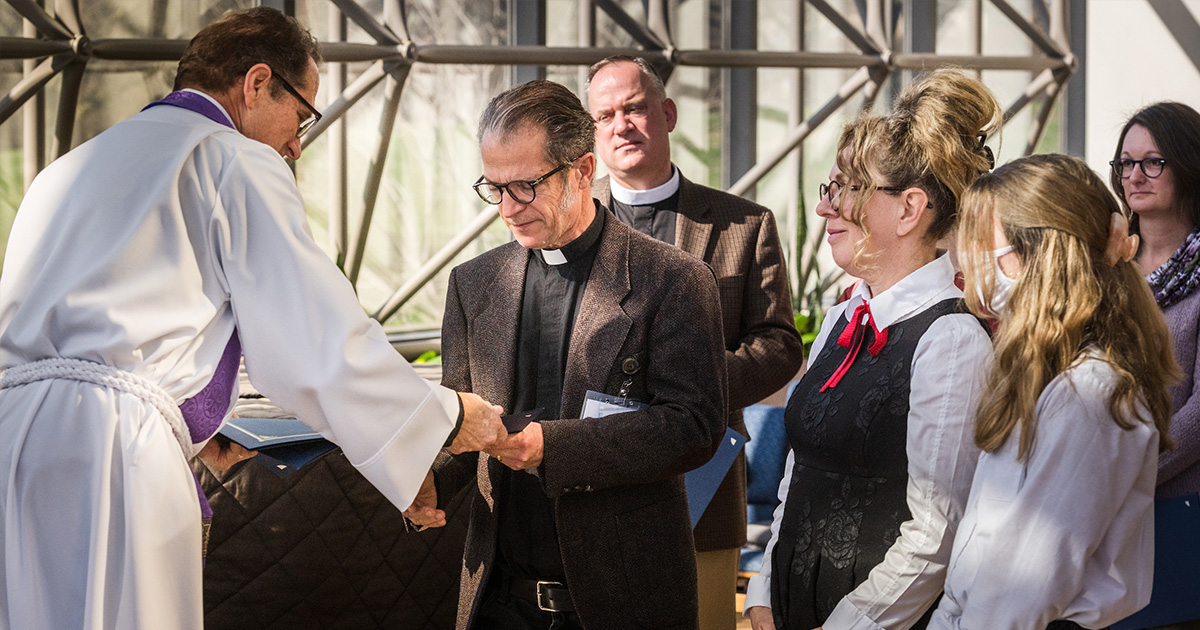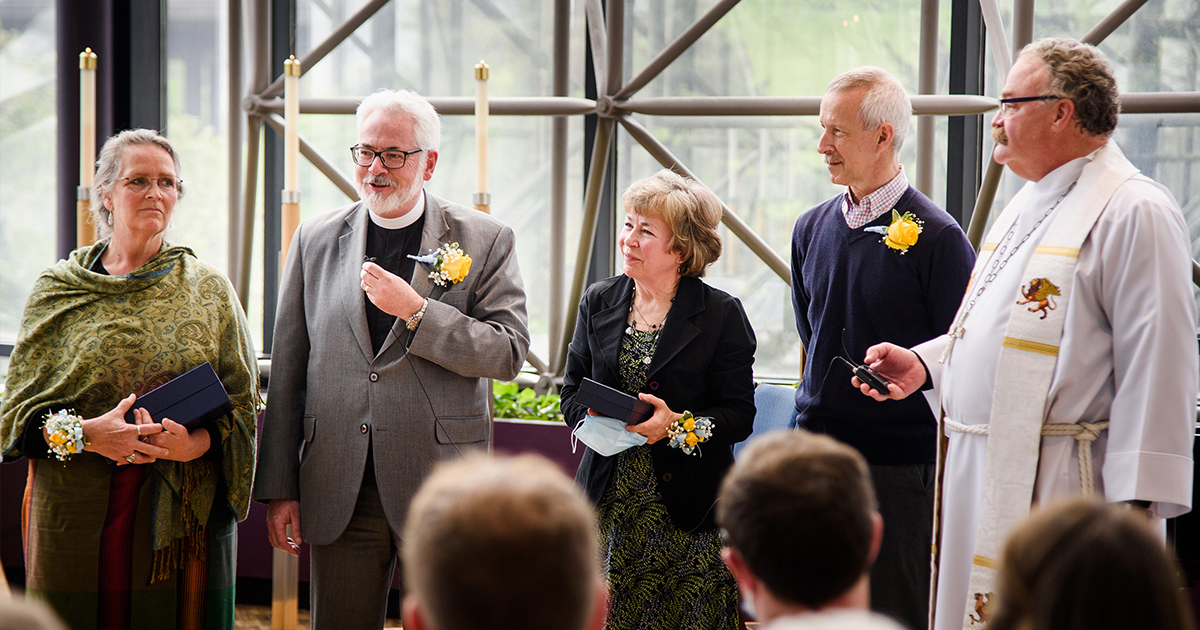
By Cheryl Magness
On March 19, a new group of Lutheran Church—Missouri Synod (LCMS) missionaries were sent during a special chapel service at the LCMS International Center (IC) in St. Louis.
Preaching on Matthew 2, the account of the Holy Family’s flight to Egypt during the reign of Herod, LCMS Office of International Mission (OIM) Executive Director Rev. Daniel McMiller told the missionaries that they, like Joseph, might sometimes find themselves thinking, “I didn’t sign up for this.” But McMiller added that, also like Joseph, they are carrying “precious cargo.”
“Joseph’s call was to care for Jesus so that He could go to the cross and die for the sins of the world and rise again. Your call is to faithfully care for … those things that support the teaching and preaching of the Gospel and the faithful administration of the Sacraments so that the world might know that Jesus has died for the sins of all and has forgiven us and given us eternal life.
“When you are tempted to say in your weakness, ‘I didn’t sign up for this,’ think of Joseph and those saints who have gone before you. … As the Holy Family was protected, so also you will be protected. … No, you didn’t sign up for this. God chose you for this. And that’s your comfort.”
Challenging year for mission work
The restrictions on travel necessitated by COVID-19 made 2020 and early 2021 a challenging year for overseas missionary work. Some missionaries sent in 2020 were not able to deploy as soon as they had hoped, and some missionaries already in the field were not able to return to the United States for home service.
Nevertheless, LCMS Chief Mission Officer Rev. Kevin Robson reported at a recent Board for International Mission (BIM) meeting that, thanks to the many individuals, congregations, LWML groups and others who form the networks of support for each missionary, there are no underfunded missionaries in the field at this time. “The fruit of our work continues to shine through in every corner of our life together,” Robson told the BIM.
Adapting and improving
New missionary orientation typically involves two separate weeks of in-person training, during which the missionaries take care of administrative details and receive coaching in network-support building, communication strategies and practical and logistical concerns related to their service. Attention is also given to meeting and building relationships with IC staff and becoming familiar with available resources. In addition, DOXOLOGY: The Lutheran Center for Spiritual Care and Counsel assists with resilience training, guiding the missionaries in reflecting on matters of spiritual care, meditation and prayer, and strategies for conflict resolution and stress management. Dr. Beverly Yahnke, DOXOLOGY’s executive director for Christian counsel, said, “At a time when the missionaries have much to do to prepare for deployment, DOXOLOGY is delighted to be able to offer spiritual comforts and psychological tools to support and assist them.”
The recently completed orientation cycle was carried out under a hybrid model, with some of the sessions held in person and others online. Kendall Cortright, director of Missionary Services for the LCMS, said the demands of preparing and sending missionaries during a pandemic have created an opportunity for the OIM to reassess the current model for training missionaries and consider changes that will enhance the process. “We hope to create more opportunities for our missionaries to connect with one another and develop relationships leading to deeper and more fruitful conversations about missionary service,”
Cortright said.
Blessings and challenges
One such opportunity occurred during the second week of this orientation cycle, April 12–16, when the recently sent missionaries returned to the IC for additional training. At the end of the week, they attended a Service of Thanksgiving for missionaries who have recently completed their service and are leaving the field: the Rev. Roger and Amy James, who served first in Sri Lanka and then in the Philippines, and the Rev. Michael and Karen Schempf, who served in Uganda.
Following the April 16 chapel service, the Jameses and the Schempfs joined the newly sent missionaries to talk about missionary life, with topics ranging from the philosophical (“Why did you decide to become a missionary?”) to the emotional (“How did you deal with the guilt of leaving friends and loved ones behind?”) to the practical (“What did you do with all your stuff?”). A significant point of discussion was expectation gaps — discrepancies between expectations and reality — and how to handle them. Also discussed at length were some of the unexpected blessings associated with mission work.
For example, while the building of a network of support is often viewed as one of the more daunting tasks a new missionary has to face, Michael Schempf said that it ended up being one of the best parts of his missionary service: “You get to go to congregations that you would have otherwise never visited and meet people you would have otherwise never met, who in turn encourage you with their prayers and support. It was delightful.”
Schempf added that the congregations are also blessed in being able to hear directly from the missionaries they’re supporting rather than sending money to a general fund where they aren’t able to see firsthand the fruits of their support.
Another blessing, said Amy James, was the joy of seeing the “commonalities that unite Christians from different cultures.” Roger James shared the experience of being able to worship even in an unfamiliar language because the presence of the liturgy made it clear what was happening.
Both the Jameses and the Schempfs agreed that one of the most difficult aspects of their missionary service was seeing how great the need was and knowing that they couldn’t possibly solve all the problems. “We simply tried to do what we could each day to have an impact,” Karen Schempf said.
Roger James said missionary work demonstrated to him “what a wretched mess the church is everywhere. … It shouldn’t be a surprise, particularly to us as Lutherans, but it still is. Until our Lord comes back, the church will always be struggling.”

Sharing in suffering and comfort
That struggle was noted by LCMS President Rev. Dr. Matthew C. Harrison during his homily at the Service of Thanksgiving on April 16.
“This Christian missionary business is a messy business,” Harrison said. “The quickest way to get burned out … is to become convinced that you have the answers and nobody else is listening to you.”
But, preaching on 2 Corinthians 1 (“For as we share abundantly in Christ’s sufferings, so through Christ we share abundantly in comfort too”), Harrison said of the challenges faced by missionaries, “God uses our afflictions to humble us so that when the people around us find themselves afflicted … we can show compassion because we know what it’s like to sin and be broken. … It’s precisely in that brokenness that we become worth something to each other.
“As Paul says, ‘If we are afflicted, it is for your comfort and salvation; and if we are comforted, it is for your comfort, which you experience when you patiently endure the same sufferings that we suffer. Our hope for you is unshaken, for we know that as you share in our sufferings, you will also share in our comfort.’”
Read more about the newest LCMS missionaries and their service below.
- Rev. Jonah and Elizabeth Burakowski, Latin America and the Caribbean
- Rev. Dr. Christian and Lula Tiews, Eurasia
- Ashley Lehr, Latin American and the Caribbean
- Johanna Heidorn, Latin America and the Caribbean
- Rev. Andrew and Megan Fedder, Eurasia
- Rev. Dr. Gerald and Heidi Paul, Latin America and the Caribbean
Posted May 3, 2021



